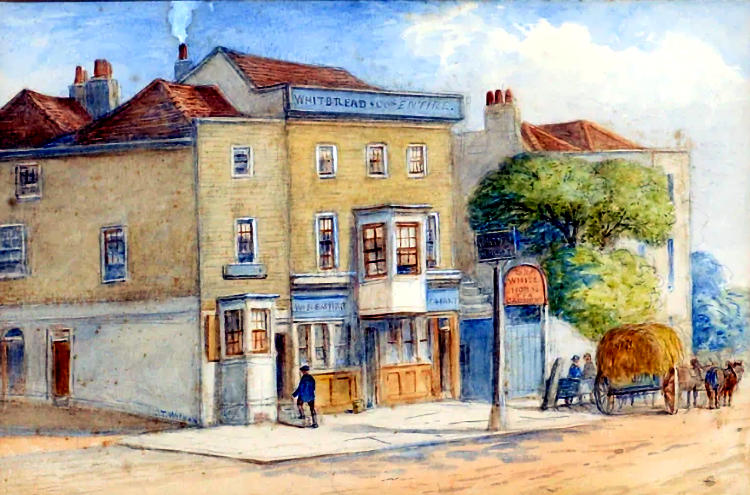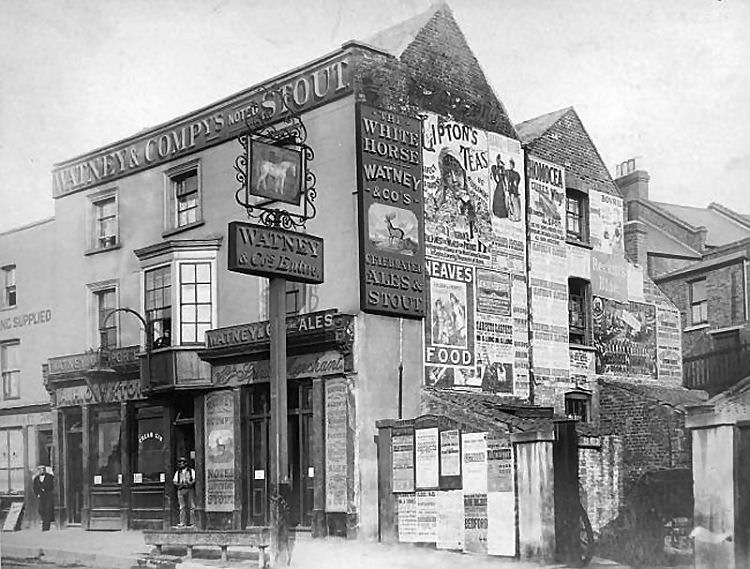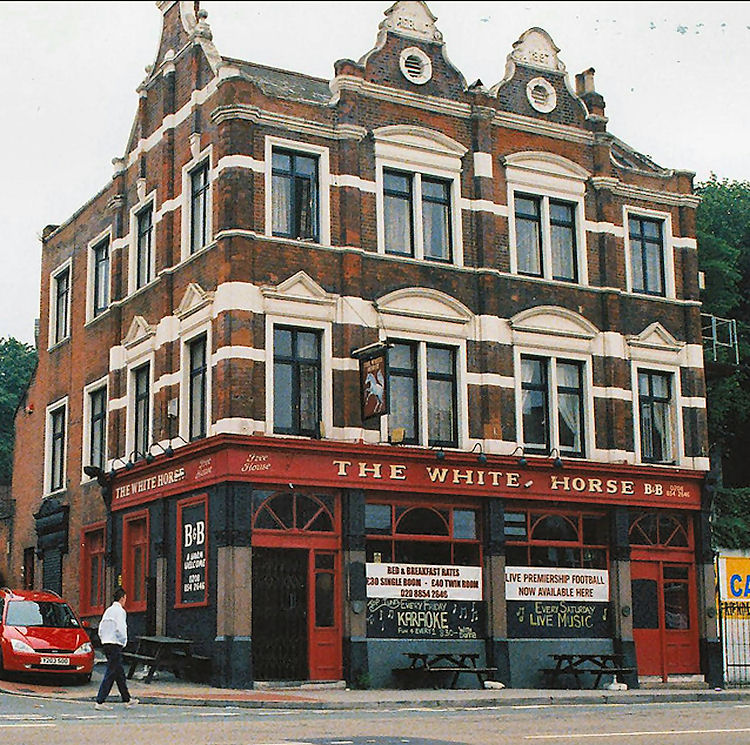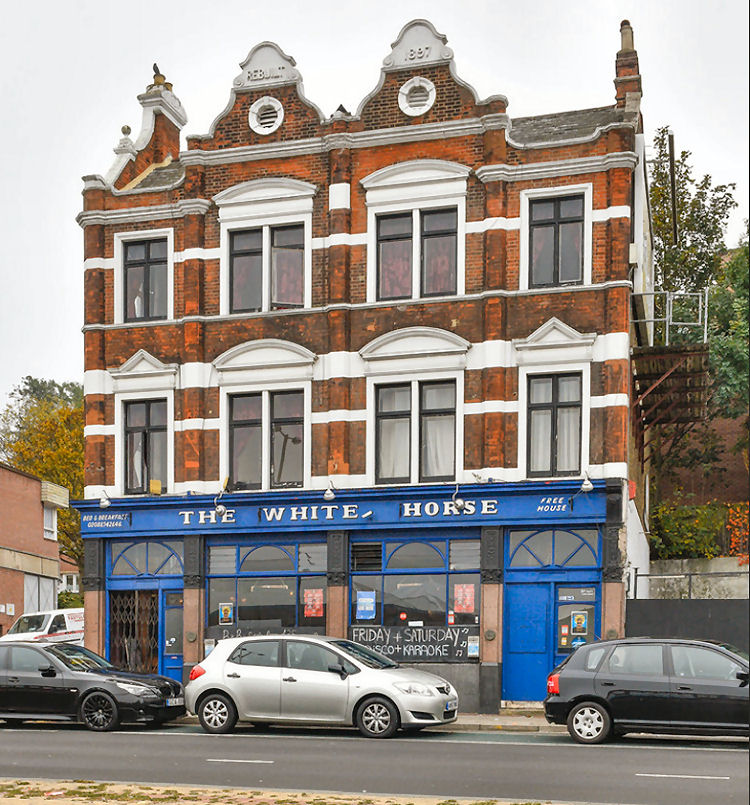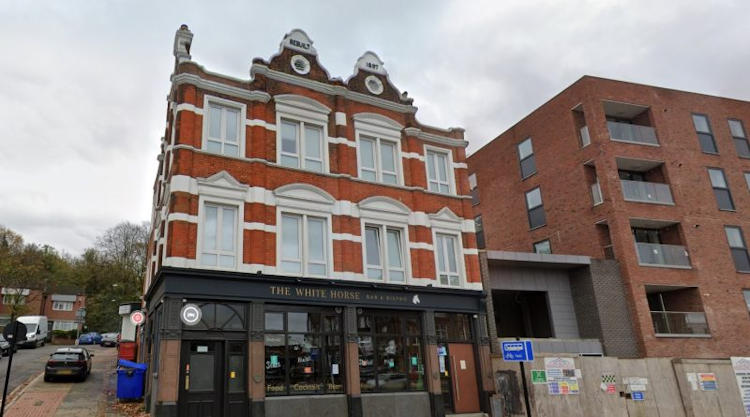|
704 Woolwich Road
New Charlton
020 8854 2646
https://whatpub.com/white-horse
|
Dover Telegraph and Cinque Ports General
Advertiser, Saturday 25 August 1849.
Robbery by a licensed victualler and his son.
At the Central Criminal Court on Tuesday last, James Watson, 53,
a licensed victualler, Jonathan Richard Watson, 23, labourer, and
Robert Hawley, 29, a labourer, where indicted for stealing 500
bricks, the property of John Brogden, the master of Hawley.
Mr. Prendergast prosecuted; Mr. Clarkson and Mr. Parnell defended
the Watson's, who are father and son; and Mr. Payne appeared for
Hawley.
The case, which lasted nearly the whole day, excited a great
amount of interest, on account of the respectable position filled by
the prisoners Watson, and the Court was very full.
The evidence adduced in support of the charge, although of great
lengths, merely established the following simple facts:- The elder
Watson is a licence victualler keeping the "White Horse," New
Charlton, Kent, and where he had resided for nearly 20-years,
hitherto enjoying and unblemished reputation, as also had his son,
who stood indicted with him; and the prisoner Hawley was in the
employ of the prosecutor, who is the contractor for the New North
Kent branch of railway open to Gravesend. In the course of
constructing the line, it became necessary to pull down some houses
at Woolwich, which, preceded their removal, were sold by auction,
and, about the middle of April, the elder Watson, who is a builder
as well as a publican, bought one of the houses for £40, and taking
advantage of the opportunity afforded him in the removal of
materials so bought, he removed a stack of bricks, the subject of
the present indictment, to his own premises, which was clearly not
included in the purchase; and the younger Watson was on the
premises, directing them to be taken away. The circumstance having
been found out, mention was made of it to the auctioneer, who had
sold the the premise brought by the elder prisoner, and he (the
auctioneer) immediately went to the Watson's, and asked them how
they came to take away those bricks, when the Elder Whatson said he
had bought and paid for them, and it was no matter from whom. Mr.
Davis, auctioneer, then said that if he did not tell him from whom
he had brought them, he should give him in custody, and he then said
he had bought them from a man at the engineers office, who was
understood to be the prisoner Hawley.
In the course of examination it turned out that, besides the
house that Whatson bought, the clerk to the auctioneer had sold to
him an unclaimed lot of old bricks, which, although not those
claimed by the prosecutor, were placed near to them.
The Court said they did not think that there was a any case
against Hawley.
Mr. Clarkson, for the elder Watson, contended that the affair was
a mistake, the bricks being sufficiently near those his client had
brought to have been taken by accident.
Mr. Parnell, for the son, adopted the same line of defence,
adding that the son had also acted under the advice of the father.
The Common Sergeant said there could not be a case against
Hawley, and there was not any evidence to show that the son might
not have thought his father had bought the bricks, and the only real
defence he could see for the elder Watson was that he might have
taken them by mistake.
The jury, after a short consultation, acquitted them.
The Watsons were again indicted in conjunction with a labouring
man named John Record, for having stolen, on the 26th of May, at
Woolwich, 1,000 bricks, the property of the same prosecutor.
In this case it appeared that, near the spot where the houses
before mentioned are situated, the railway companies works were
being carried on, and a vast number of new bricks were continually
received and carted from there to the tunnel at Charlton. About a
week before the date named in the indictment the elder Watson asked
Mr. Barnes, a builder, living at Sandhill, Plumstead, if he wanted
to buy any new bricks, and he agreed to take 4,000 or 5,000, at £1
8s. a thousand, and about a third of the quantity were sent in, but
the rest not arriving, Mr. Barnes called, on the 25th, at Watson's,
to know why they had not come, and he (Watson) said they should be
there the next morning. The Watsons then engage the man Record to go
to the brick-stack in question and bring away 1,000 bricks, at the
same time that the other carters were taking them, and if any
questions are asked, to say they were for the works at the Charlton
tunnel. One of the men connected with the works seeing the cart
engaged by the Watson's, made some enquiries, and the answer not
satisfying him communicated with the foreman of the works, that once
instituted enquiries, and the result was that the cart, which had at
first started off in the direction of the tunnel works, was traced
to Watson's premises, and a quantity of new bricks were there found
stacked over with old ones. Upon being taxed with the robbery, the
elder Whatson said there must have been some mistake, and wished to
pay for them. The police were then called in, and the elder Watson
seemed extremely anxious to have the affair hushed up.
The jury found both of Watson's guilty, recommending them to
mercy on account of their previous good character, and, by the
direction of the Court, acquitted Record.
The Common Serjeant said it was an extremely bad case, especially
against the Elder prisoner; still the younger one had taken an
active part in the matter, which he had most likely been led into by
his father.
The younger Watson said he had.
The Common Serjeant:-. But you were old enough to know you were
doing wrong, and it is a very bad case; here is no poverty, want, or
excuse of any kind, and a person in good circumstances carrying on a
wholesale system of robbery. However, the jury and the prosecutor
have both recommended them to mercy, and the sentence was, that the
younger prisoner being prison for 6, and the elder one for 18
months, and kept to hard labour.
|
|
From the Borough of Greenwich Free Press, 21 November, 1857.
TRANSFER OF LICENSES, Nov. 14.
(Present — Sir T. M. Wilson, Bart. (Chairman), T. Lewin, J. Sutton,
and E. Eagleton, Esqrs.)
Charlton.
"White Horse," George J. Watson to Philip Adolphus Rheinlander.
|
|
From the Greenwich and Deptford Chronicle and the Woolwich Gazette,
Saturday, 4 January, 1910.
HUSBAND AND WIFE. Police Court Application.
MAGISTRATE SAYS "RATHER SOON TO SEPARATE."
At the Woolwich Police Court on Wednesday, before Mr. Hutton, John
Bushell, licensee of the "White Horse," Woolwich Road, Charlton, was
summoned for assaulting Julie Josephine Bushell, his wife, and for
persistent cruelty.
Painful disagreements between a Charlton husband and wife were
related to Mr. Hutton at Woolwich Police Court on Wednesday
afternoon.
John Buahell, licensee of the "White Horse," Woolwich Road,
Charlton, was summoned for assaulting Julie Josephine Bushell, his
wife, and for persistent cruelty.
The parties were married on 19th April last, and Mr. Hutton remarked
"Rather soon to separate."
Mr. Storry Dean, barrister, said they had only been married six
weeks when defendant struck his wife in the bar with his clenched
fist knocking her down. He promised that nothing of the kind should
occur again, and his wife continued to live with him. In July he
knocked her town again, however, and went on treating her unkindly
at times.
On October 30th, he took hold of her arm and, pressing it back in a
very painful manner, threatened to break it. Complainant was very
fond of her husband, and she still continued to live with him, but
in November he knocked her down twice and kicked her once.
The day after he struck her twice and, having drawn himself a bottle
of Bass, put it to the highly improper use of throwing it over her.
Defendant was very fastidious about his meals. He demanded
everything to be hot, but, when detained by press of business he
found his food cold, he would fly into a temper.
Once, his wife was so frightened when he stayed out until a meal was
not quite so hot as he liked it, that she went for a long tram ride
to get out of his way. When she returned she found the door was
bolted against her, and she had to go to the house of some friends.
At one o’clock her husband came after her, and wanted her to go
home. She went at once, and on the way home he struck her, so that
she made a complaint to a constable. Defendant then strode on ahead
and locked her out again.
Mr. Dean urged that these acts constituted persistent cruelty, and
she should not be compelled to live with him again. If an amicable
arrangement could be come to, even at that hour, she would accept
it, but she felt she could not live with defendant any longer.
BLACK EYE AND BRUISED ARM.
Complainant, giving evidence in support of counsel's statement, said
the first assault produced a black eye, and that a upon her arm hurt
her so much that she had not got quite bitter from it yet.
She was his second wife, and there were children of the first
marriage.
She left her husband, but went back for some things, and eventually
agreed to stay. The reconciliation came about through a friend, who
said they were spoiling both their lives. Defendant would not speak
for some time, and then he said "What does she want? Does she want
me to go on my knees to her?" She said she did not want that, but
wanted him to speak calmly and coolly, and say what he meant to do.
After a while he began his conduct again. On one occasion he had
gone out, and she had kept his dinner warm for him. When he came
back he threw the food up the stairs and told her to get him another
dinner. She cooked some fish, and that went on the fire. The night
she was locked out one of the barmaids tried to open the door for
her, but could not because it was padlocked. The next day defendant
sent the barmaid away. When he had struck her in the street and
locked her out again, she had to walk about until five in the
morning. She became ill through a cold she caught, and when she got
better went away to stay with a sister.
Mr. Hatton:- Since you have been married, how many times has he
struck you?
Complainant:- Five or six times.
Mr. Hatton:- How many times hare you had a black eye?
Complainant:- Twice.
In cross-examination, by Mr. George Clinch, complainant said she was
a barmaid before she was married to defendant. She had never asked
him for money but ones or twice, and she did not complain of any
meanness in that respect. She did once break one or two glasses, but
that was to frighten her husband.
The Motor Car Ride.
Complainant related an incident of a motor ride. Her brother-in-law,
who has a public house in the Strand, came to see them, and as he
stayed late, asked her and the defendant to accompanying him home in
his motor, so that there would be no trouble between him and his
wife. They went, starting at 1 in the morning. After seeing him home
to protect him, as the magistrate suggested, complainant and her
husband took a walk round Covent Garden, and then returned home,
arriving at Charlton about 5 o'clock.
Mr. Hutton asked if they had any rum and milk, which, he understood,
was a very popular drink in Covent Garden.
Compliant replied they did not, but she had some coffee, and she
believed her husband put some whiskey in it to warm her up. It was
not true, as Mr. Clinch had suggested, that she was in the habit of
getting drunk. Once she did go to bed with her clothes on, but that
was because she had a bad cold, and, her husband having locked the
door, she could not get any other cloths.
Dr. Berry, of 588, Woolwich Road, Charlton, called by Mr. Dean, said
he was called in on the day when complainant went to bed in her
clothes. She was the worst for drink. He asked that she should be
undressed, because he had been called as she had complained of
internal pains, but she replied that she would be alright in the
morning.
Mr. Dean:- Did she look as though she had been wandering about in
the streets from 1 o'clock in the morning to 5?
Dr. Berry:- She did not. I should be surprised to hear she had been
doing that,
Locked Out.
Mrs. Bushel was recalled and was asked by Mr. Clinch whether she
ever locked her husband in the bedroom. Her reply was that she did
not, but he locked himself in and lost the key; he found it next
morning on the mat.
Mr. Clinch:- Have you, in the presence of two men, threatened to
murder your husband?
Complainant:- No.
Mr. Clinch:- Have you not thrown a number of glasses at your husband
in the presence of customers?
Compliant:- I have not. I threw some glasses on the floor when he
beat me.
Mr. Clinch:- Is it not a fact that when your husband pushed you and
you would admit he did push you, it was always because you got
drunk?
Compliant:- No, it is not. It is my husband who takes too much
drink.
Mr. Clinch:- Have you stated since the summons you issued that you
took it out on the impulse of the moment?
Compliant:- I have.
Mr. Clinch:- Did you not write to him and suggest that he had better
take the matter out of the solicitor's hands?
Complainant:- I wanted it settled out of court.
Mr. Clinch:- You thought the lawyers had better be out of it?
Complainant:- No. What the solicitors do for me, I pay them for.
Mr. Clinch put in a telegram she sent to her husband, and asked as
to words, "no interference" in it.
Complainant expressed the opinion that these words were inserted by
her sister.
At this stage, Mr. Hutton adjourned the case until January 17th, at
3 p.m, observing he thought it might be settled by that time. |
The original building was rebuilt in 1897. Currently (2020) closed, but
being renovated.
I am informed that the pub is again open as of October 2020, but in
November 2023, it closed and changed name to a Vietnamese Restaurant called
"Saigon City."
LICENSEE LIST
WATSON James 1840-49+
WATSON George 14/Nov/1857
RHEINLANDER Philip Adolphus 14/Nov/1857-62+ (age 54 in 1861 ) )
HOWLETT James Aug/1866-74+
HOWLETT Charles 1878+
PROCHOWNICK Maximillian William 1878+
HARPER Joseph 1882-85
RICH John 1885-Nov/90

OVERTON Arthur Henry Nov/1890-93 (widow age 58 in 1891 ) )

EARLE E Mrs 1896+
BUSHELL John 1901-10+ (age 35 in 1901 ) )
DIXON Edward 1919+
PATRICK Henry Joseph 1934-44+
HARRIS Edwin Horace (Ted & Betty) 1964-68
FARMER A 1988-90+
https://pubwiki.co.uk/WhiteHorse.shtml
 Census Census
 Woolwich Gazette Woolwich Gazette
|
